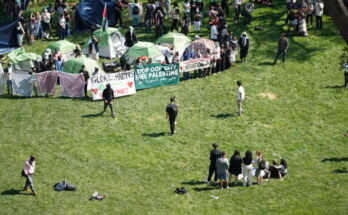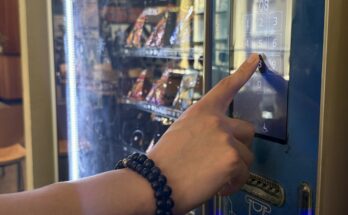By MICHAEL ODMARK
BROOKLYN COLLEGE, CUNY: “It works!” said Mayor de Blasio after making a test call at Thursday’s public launch of LinkNYC, a new program replacing pay phones throughout the city with kiosks providing free Wi-Fi, domestic phone calls, USB charging ports, and more.
The program will expand on a rolling basis throughout all five boroughs over the next 12 years, resulting in an estimated 500 stations by July, and 7,500 by 2019, de Blasio said. He called it the largest and fastest free public Wi-Fi network in the world, offering users download speeds of one gigabit per second.
The massive program, which is estimated to cost upwards of $300 million, will not cost tax-payers a dime, de Blasio said. The kiosks, called Links, are being paid for entirely through advertising revenue.
The ads are displayed on HD screens much like the ones recently installed in many subway stations. Colin O’Donnell, Chief Technology Officer of CityBridge, the consortium of companies selected by de Blasio to develop and operate the network, explained that the advertisements will not affect other aspects of the service.
The program is a part of the city’s larger effort to bridge the so-called “digital divide” by bringing free, superfast internet to low-income neighborhoods. “The internet is not a luxury,” said de Blasio, emphasizing the need for all New Yorkers to have easy access to the resources and connections provided by the internet.
Mayoral counsel Maya Wiley estimated that three quarters of African-American and Latino New Yorkers use their smartphones exclusively to access the internet, and LinkNYC will offer these people a way to access the internet without using their data plans.
In the Q&A portion of the press conference, many voiced concern for user security. To access the Wi-Fi network, users have to input their email address, which O’Donnell explained was necessary for the company to contact users in the event that they change their privacy policies.
“Privacy is very important to us,” O’Donnell said. “And we will never share email addresses or identifiable information with any third parties.” He did admit, however, that aggregated, anonymized data will be collected and utilized for the city and company’s efforts to improve and enhance their services.
Each Link is also equipped with a video camera, which is primarily designed for the purpose of video calls, O’Donnell said. The video cameras are therefore user-activated.
In the event of a criminal investigation, however, O’Donnell explained that CityBridge will be able to access and offer user information—including video capture—to law enforcement. For additional safety measures, the kiosks each feature a red 911 button to contact emergency services.
In addition to offering Wi-Fi within a 150-foot radius, the Links also feature a tablet for accessing the internet, two USB charging ports, and a free telephone for making domestic calls. At the time of Thursday’s launch, there were about a dozen Links currently active, mostly along 3rd avenue. The program will continue to expand into the five boroughs in the coming months.




